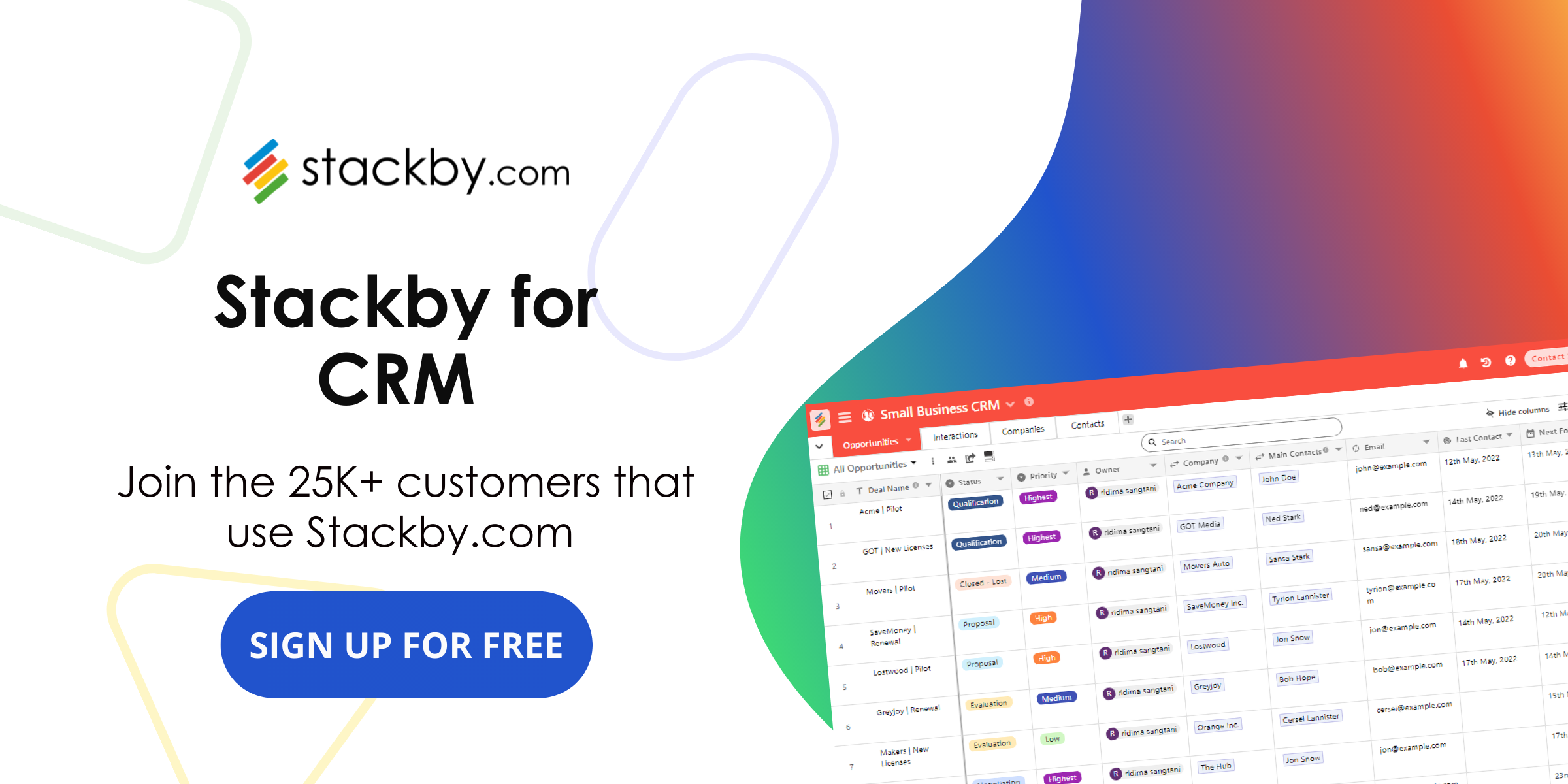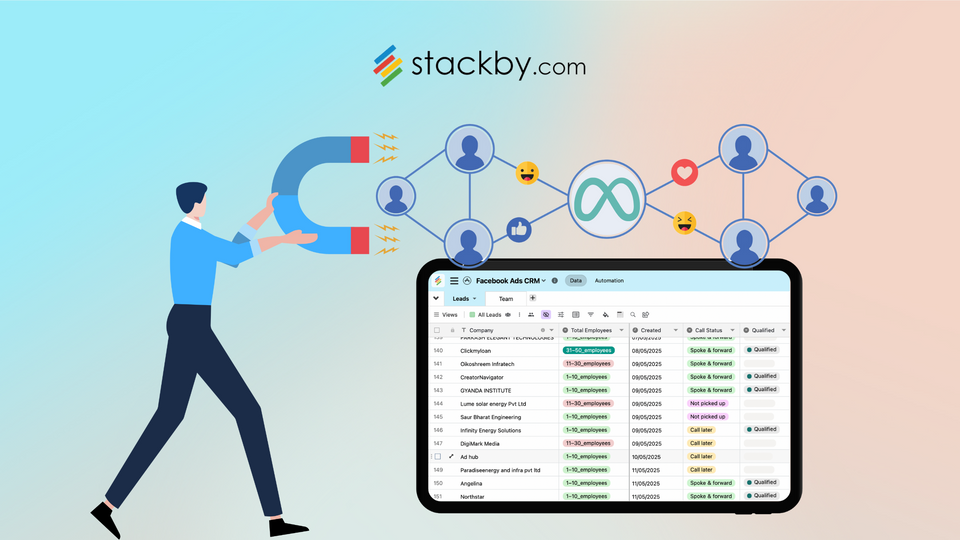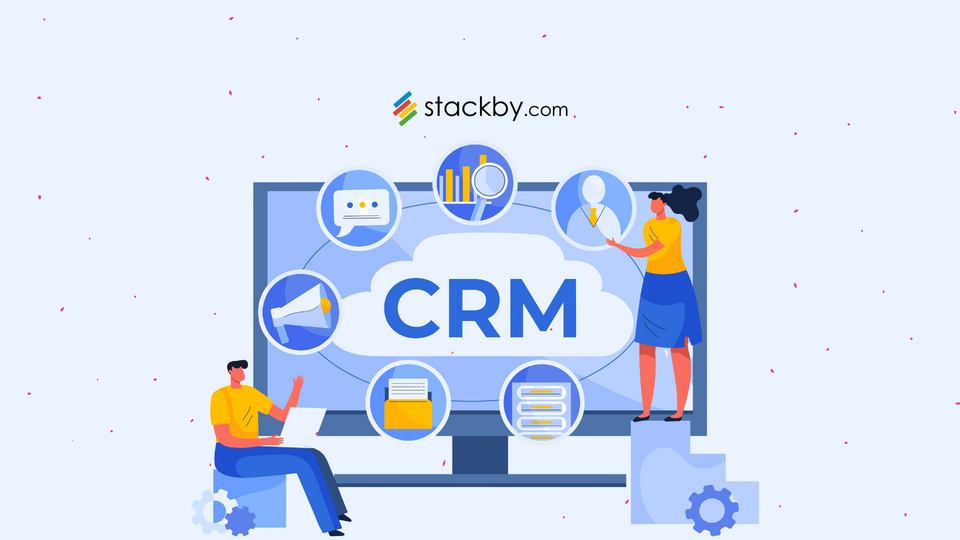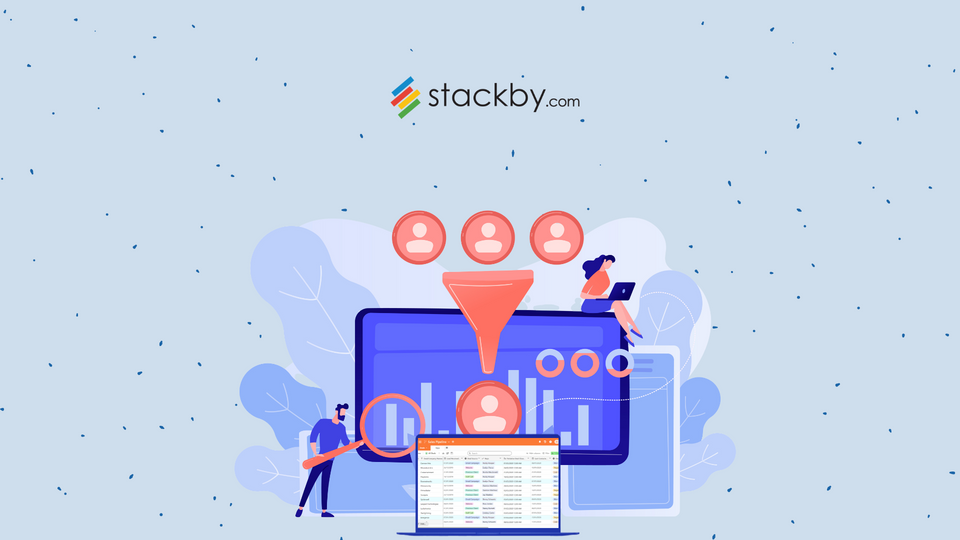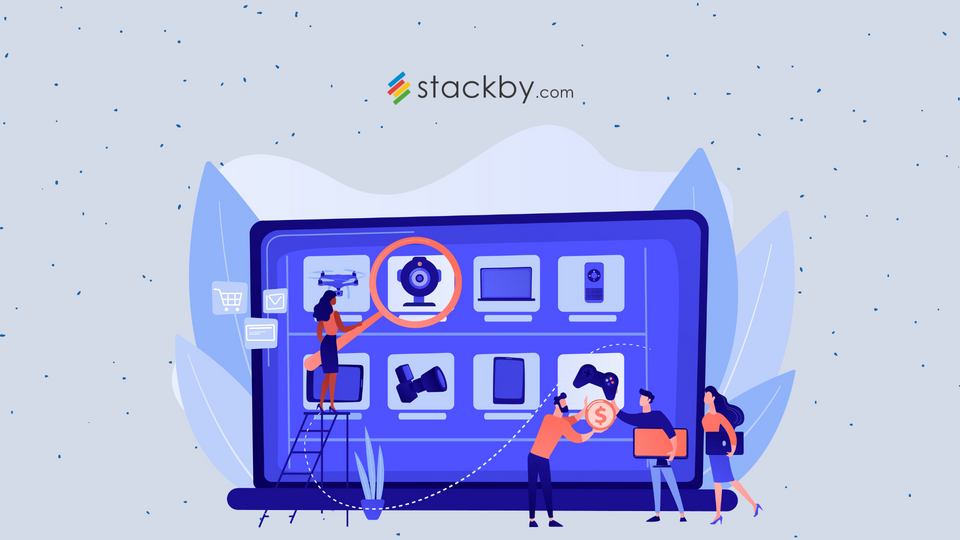How to Build Solar CRM to Power up your Solar Business
Looking for the best CRM for solar companies? Build your own solar CRM to manage leads, sales & installs with customizable solar CRM software.

What is Solar CRM Software?
Solar CRM software is a specialized customer relationship management (CRM) system tailored to meet the unique needs of solar businesses. It helps streamline and automate critical processes such as managing customer interactions, tracking leads, organizing sales pipelines, and handling post-installation support. Unlike generic CRM tools, solar CRM systems come equipped with features specifically designed for the solar industry, including solar project management, system design integration, and proposal generation.
With solar CRM software, solar businesses can efficiently track every stage of the customer journey—from initial inquiries and quotes to system installation and long-term maintenance. This not only saves time but also improves communication and enhances overall customer satisfaction.
For solar companies looking to scale operations, the best solar CRM solutions provide advanced analytics and reporting, helping businesses optimize their sales strategies and boost conversions. By automating repetitive tasks and offering a centralized platform for customer and project data, solar CRM ensures your team stays productive and focused on growing your solar business.
Why does a solar company need a Solar CRM?
Running a solar business involves managing multiple complex processes—from lead generation and system design to installation and post-installation support. Without the right tools, these tasks can quickly become overwhelming and inefficient. This is where solar CRM software comes in. A solar CRM system is specifically designed to streamline operations, automate workflows, and help solar companies achieve better results.
#6 Top Reasons why a Solar Company needs a Solar CRM
1. Manage Leads Easily
Managing leads is crucial for any solar business. With solar CRM software, you can organize, track, and nurture leads effortlessly. The CRM ensures you never miss a follow-up by automating reminders and keeping all customer information in one place. This helps convert potential customers into paying clients faster.
2. Boost Team Productivity 🚀
Manual data entry and scattered processes waste time and resources. By automating routine tasks, such as follow-ups and data management, a solar CRM system enables your team to focus on what truly matters—growing your business.
3. Better customer communication 👩💻👨💻
Maintaining clear and consistent communication with customers is vital for any business. A solar CRM centralizes all customer interactions, including emails, calls, and follow-ups. For solar companies handling high volumes of customer inquiries, integrating contact center solutions can further enhance communication efficiency and reduce response times. This ensures your team stays organized and provides a seamless customer experience.
4. Streamline Sales & Quoting Process 💼✍️
Solar sales involve creating accurate proposals, quotes, and contracts. The best solar CRM systems come with built-in tools for proposal generation and project estimation. These features save time, eliminate errors, and allow sales teams to focus on closing deals instead of repetitive manual tasks.
5. Grow your solar business at scale
Whether you're a small solar startup or a large enterprise, solar CRM systems can scale with your business. As your customer base grows, the CRM will support additional projects, team members, and processes without slowing down your operations.
6. Advanced Reporting & Analytics 📈
Data-driven decisions are key to growing a solar business. With solar CRM software, you get access to advanced reporting tools that provide insights into sales performance, lead conversion rates, and customer trends. These insights help you optimize strategies and identify growth opportunities.
7 Steps to Build a Customizable Solar CRM
Building a solar CRM doesn’t have to be complicated or costly. With tools like Stackby, you can create a custom, flexible, and easy-to-use solar CRM system tailored to your solar business needs. Whether you’re managing leads, projects, or customer communications, Stackby’s no-code platform can help streamline your workflows. Follow this step-by-step guide to set up your own solar CRM software using Stackby.
For more industry-specific templates, see our Stackby templates page.
➡️ Step 1: Set Up a New Workspace in Stackby

#1. Sign Up or Log In:
- Start by creating a Stackby account or logging in to your existing one.
#2. Create a Workspace:
- Go to the dashboard and click on “Create New Workspace.”
- Name your workspace (e.g., Solar CRM Workspace).
#3. Add a New Stack:
- Click on “Add a New Stack ” and select “Start from Scratch.”
- This will serve as your foundation for the solar CRM.
➡️ Step 2: Define the Key Tables for Your Solar CRM

Organize your data by creating separate tables for different aspects of your solar business.
📊 Table 1: Leads Management 🧲
🧮 Columns to add:
- Lead Name
- Contact Details (Email, Phone)
- Lead Source
- Lead Status (e.g., New, In Progress, Converted)
- Follow-Up Date
- Use a dropdown list for “Lead Status” to easily track where each lead stands.
📊Table 2: Solar Projects ☀️
🧮 Columns to add:
- Project Name
- Client Name
- System Size (kW)
- Project Stage (e.g., Proposal Sent, Design, Installation, Complete)
- Assigned Team Member
- Start Date and End Date
📊 Table 3: Proposals and Quotations 📄
🧮 Columns to add:
- Proposal ID
- Client Name
- Proposal Amount
- Status (e.g., Sent, Approved, Rejected)
- Last Follow-Up Date
📊 Table 4: Post-Installation Support 🛠️
🧮 Columns to add:
- Client Name
- Installation Date
- System Health Check (e.g., Pending, Completed)
- Next Maintenance Date
- Comments
📊 Table 5: Ticket Management 🎟️
🧮 Columns to add:
- Ticket ID: A unique identifier for each ticket.
- Client Name: Name of the client who raised the ticket.
- Issue Description: A brief summary of the issue reported.
- Ticket Status: Use a dropdown list (e.g., Open, In Progress, Resolved, Closed).
- Assigned Team Member: The person responsible for addressing the ticket.
- Date Raised: The date when the ticket was created.
- Resolution Date: The date the ticket was resolved (if applicable).
- Priority Level: Use tags such as Low, Medium, High, or Critical for prioritization.
- Comments/Updates: A column to log additional details or updates related to the ticket.
➡️ Step 3: Customize Your Tables and Columns
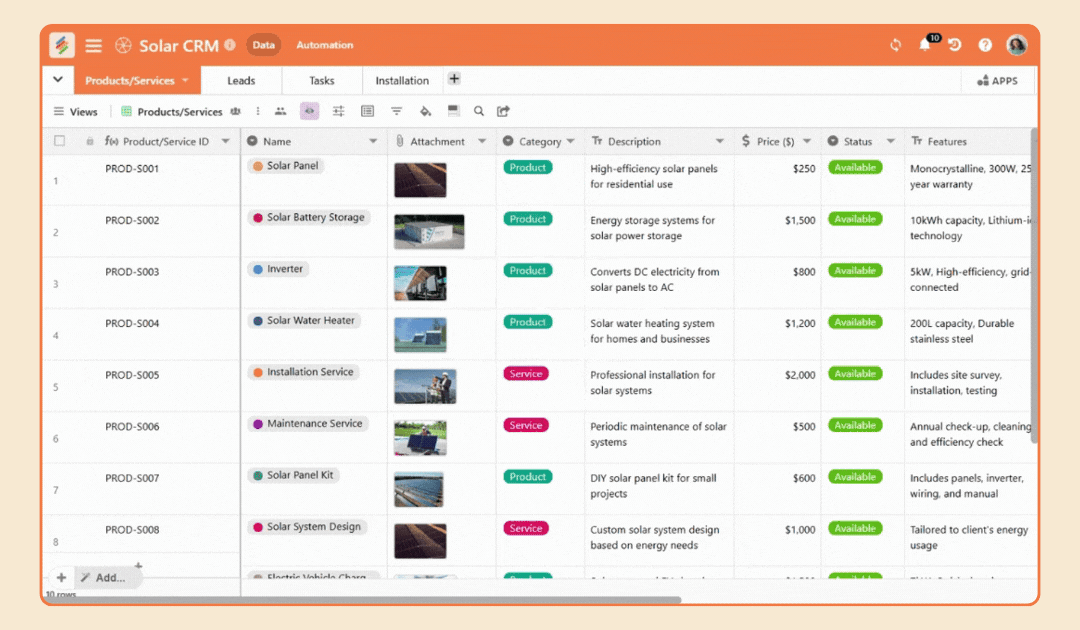
Stackby allows you to add different column types to organize your data effectively.
Add Column Types:
- Use “Single Select” for status tracking (e.g., Lead Status, Proposal Status).
- Add “Date” columns for scheduling follow-ups and project deadlines.
- Use “Attachment” columns to upload project documents, proposals, or images.
- Add “Link” columns to connect related tables (e.g., linking Leads with Projects).
Organize Views:
- Create different views for better usability, such as:
- Grid View: To see all data in table format.
- Kanban View: To track lead or project statuses visually.
➡️ Step 4: Automate Workflows Using Integrations

To make your solar CRM system more efficient, integrate Stackby with other tools.
📧 Email Integration:
- Use integrations like Gmail to automate follow-up reminders and manage email communications.
📅 Calendar Integration:
- Connect with Google Calendar to track important dates (follow-ups, project deadlines, maintenance checks).
🔍 Lead Management:
- Integrate tools like Google Forms or Zapier to automatically add leads into your CRM.
➡️ Step 5: Create Automations for Repetitive Tasks
Automate manual tasks to save time and ensure no detail is missed.
- Set Up Reminders: Use Stackby’s automation feature to set reminders for follow-ups or maintenance schedules.
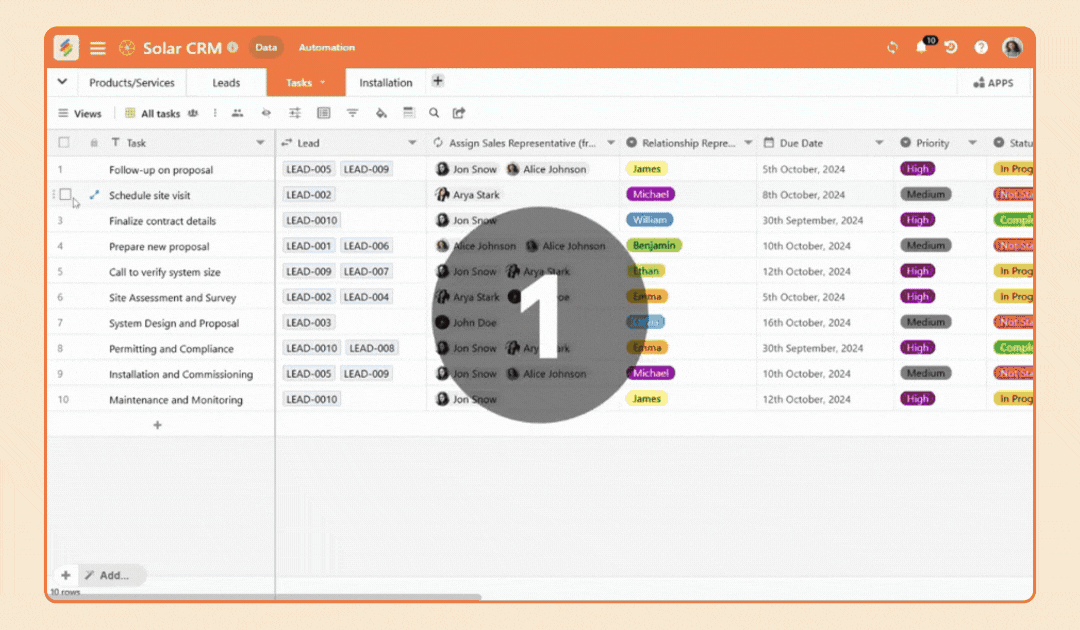
- Update Status: Automatically update lead or project statuses when certain conditions are met (e.g., Proposal Approved → Move to Project Stage).

➡️ Step 6: Create Dashboards for Insights

To monitor your solar business performance, use Stackby’s dashboard capabilities:
Add summary blocks to visualize key metrics like:
- Number of Leads
- Conversion Rate
- Ongoing Projects
- Revenue from Approved Proposals
Use charts and graphs to analyze trends and make data-driven decisions.
➡️ Step 7: Train your Team and Start using your CRM
- Onboard Your Team: Provide a quick walkthrough of your new solar CRM software. Show them how to add leads, manage projects, and update statuses.
- Monitor Usage: Ensure the team uses the CRM effectively for lead tracking, project updates, and customer communication.
- Iterate and Improve: Based on feedback, refine your workflows and tables to better meet your business needs.
Start Building Your Solar CRM Today!
Building a solar CRM system with Stackby is a cost-effective way to streamline your operations and scale your solar business. With customized tables, automation, and integrations, you’ll save time, improve productivity, and deliver better customer experiences.
Still confusing to build to workspace No worry will guide you let’s arrange demo call with our expert.
Best 3 Solar Software CRM Companies
➡️ Comparison Table : Easy of Use | Features | Integration | Pricing
#1. Stackby : Best Solar Business Management Software
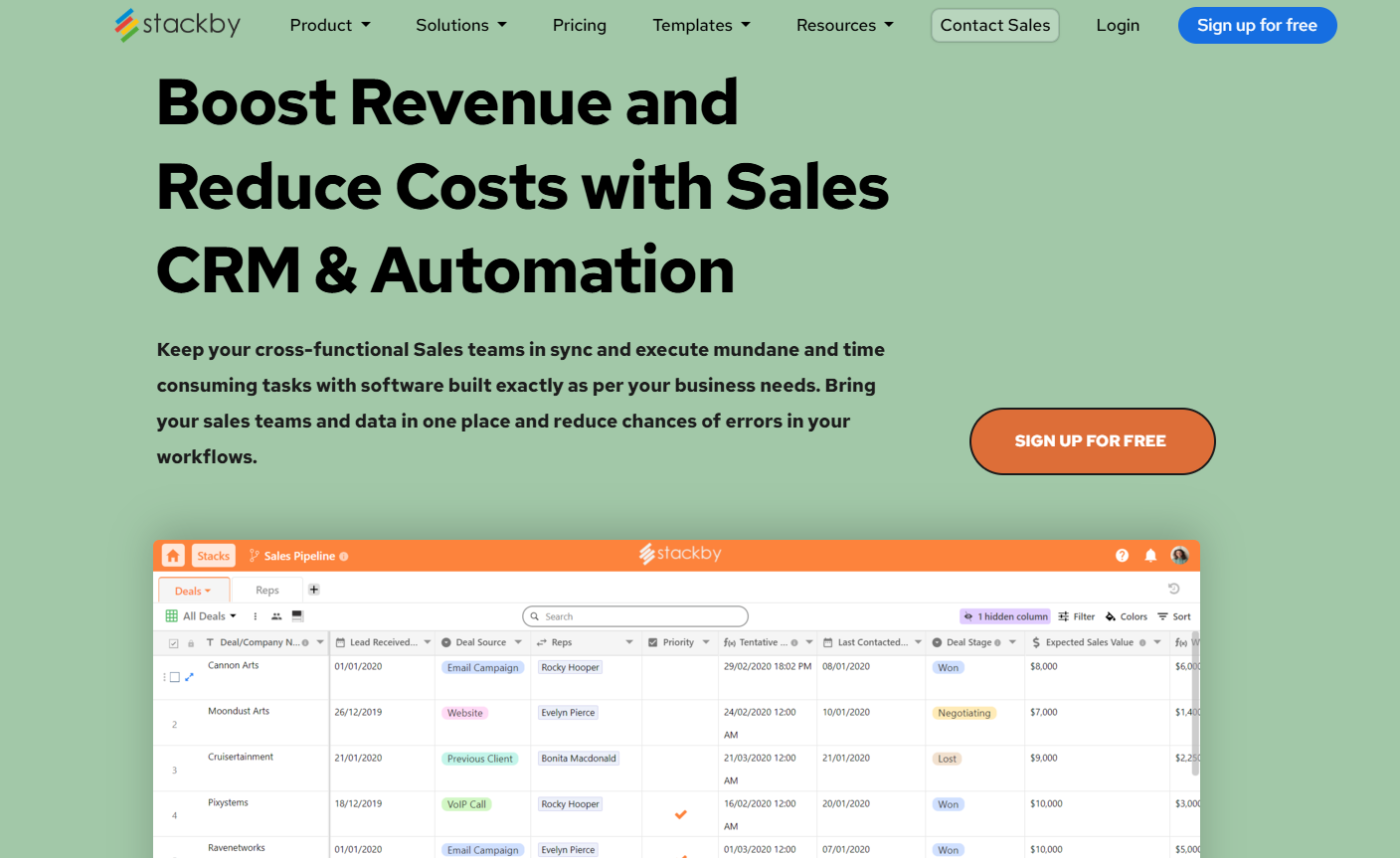
Stackby is a no-code, fully customizable work management platform that allows businesses to create personalized CRM systems, project trackers, and workflows. With the flexibility of a spreadsheet combined with database functionality, Stackby enables solar businesses to manage leads, track projects, automate tasks, and analyze data—all in one place. It integrates with popular tools like Gmail, Google Calendar, Zapier, and more, making it a versatile and cost-effective solar CRM solution.
Best for: Small to large solar teams looking for an affordable, highly customizable, and scalable CRM without technical expertise.
Features :
- Fully customizable no-code CRM platform.
- Create tables for leads, proposals, project management, and post-installation support.
- Automations for task reminders, follow-ups, and workflow updates.
- Powerful integrations with tools like Gmail, Google Calendar, Zapier, and Google Sheets.
- Real-time collaboration for teams.
- Custom dashboards and reporting for data-driven insights.
Pricing :
Free Plan: Limited features for small teams.
Pro Plan: $9/user/month (billed annually).
Enterprise Plan: Custom pricing based on requirements.
2. Solarplus.co

SolarPlus.co is a dedicated solar business management and proposal software designed to simplify sales and project workflows for solar companies. It provides automated proposal generation, system design tools, project tracking, and financial insights to help solar teams close deals faster and manage installations efficiently. Its mobile-friendly interface makes it ideal for on-the-go sales teams.
Best for: Solar sales-focused businesses that need proposal generation, financial analysis, and project monitoring in one platform.
Features:
- Dedicated solar CRM and proposal software.
- Automated system design and financial proposal generation.
- Integrated project management tools to track installations.
- Invoicing and payment tracking built in.
- Mobile-friendly interface for sales teams on the go.
- Real-time monitoring and reporting for project progress.
Pricing:
- Starter Plan: $150/month for small teams.
- Professional Plan: $250/month for growing solar businesses.
- Enterprise Plan: Custom pricing for large-scale operations.
3. Whsuites.com

WHSuites.com is an all-in-one solar business management platform that offers CRM, project scheduling, lead tracking, and marketing automation. Designed specifically for solar companies, WHSuites helps streamline processes such as lead follow-ups, proposal estimations, and project scheduling. It also includes tools for email and SMS campaigns, allowing businesses to manage both operations and marketing from a single platform.
Best for: Solar companies looking for a comprehensive tool to manage leads, operations, and marketing with minimal third-party integrations.
Features:
- Comprehensive solar business management platform.
- CRM with lead tracking and follow-up automation.
- Integrated tools for project estimation and installation scheduling.
- Marketing automation to run email and SMS campaigns.
- Cloud-based system for remote team collaboration.
- Reporting tools for analyzing sales, leads, and customer data.
Pricing:
- Basic Plan: $99/month (up to 3 users).
- Professional Plan: $299/month (up to 10 users).
- Enterprise Plan: Custom pricing for large businesses.
Why Choose Stackby Compared to Others?
1. Affordable and Flexible Pricing:
- Unlike SolarPlus.co and WHSuites.com, Stackby starts at just $9/user/month, making it highly affordable for small and mid-sized solar businesses.
2. Full Customization:
- With Stackby, you can create a completely customized solar CRM tailored to your business workflows, while SolarPlus.co and WHSuites.com offer pre-built features with limited flexibility.
3. Powerful Integrations:
- Stackby integrates seamlessly with tools like Gmail, Google Calendar, and Zapier, allowing you to automate workflows, unlike SolarPlus.co, which has limited integrations.
4. No-Code Setup:
- Stackby’s intuitive no-code platform makes it easy for anyone to build and use a solar CRM system, even without technical expertise.
5. Scalability:
- Whether you’re a small team or a large enterprise, Stackby scales with your business needs without breaking the bank.
Conclusion
If you’re looking for an affordable, flexible, and powerful solar CRM software, Stackby is the best option for your solar business. It offers unmatched customization, advanced integrations, and an intuitive setup—making it ideal for solar businesses of all sizes.
